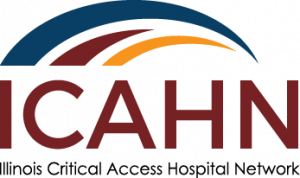12/21/2020
Jersey Community Hospital honored for excellence in telehealth
As of December 21, more than 905,000 Illinoisans have tested positive for COVID-19 and more than 15,000 of the state’s residents have died from the virus. With restrictions in place to protect public safety, the healthcare delivery system has pivoted to meet ongoing healthcare needs as well as pressures resulting from the pandemic.
“As the pandemic lingers, we understand that there is social, emotional and mental fatigue,” said Dr. Ngozi Ezike, Director of the Illinois Department of Public Health. “Being able to connect with your healthcare professional via telehealth is one way we can increase access to services for ongoing mental and physical health issues while maintaining social distancing.”
Governor J.B. Pritzker’s Executive Order and Virtual Care Program allowed regulatory flexibility to deliver telehealth and what followed was an immediate, seismic shift in healthcare service delivery. Patient demand for telehealth services increased exponentially in alignment with the need for physical distancing. For this quick response, Gov. Pritzker received the Partnership for a Connected Illinois (PCI) Excellence in Telehealth Leadership for Improved Policy Changes to Advance Telehealth and for Advancing Telehealth by innovation during a Zoom event held in November. The Illinois Critical Access Hospital Network nominated Gov. Pritzker for the honor.
The impact of these actions was felt immediately. Within days of the Governor’s Executive Order, the percentage of telehealth visits by community mental health providers went from 10% to nearly 90%. Telehealth use in Illinois has remained at a significant and sustained level, with strong support from patients and providers to make this optional flexibility to access care permanent.
“The Governor’s leadership fueled healthcare’s speed to action and innovation across the state,” said Nancy Kaszak, Director, Illinois Telehealth Initiative. “Lifting constraints around telehealth to ensure continuity of care has already had an impact and is why it should be here to stay.”
Many of Illinois’ hardest hit communities were also those who also suffer the most from chronic diseases, social determinants of health, and access issues. PCI was pleased to recognize Jersey Community Hospital, Jerseyville, and Norwegian American Hospital, Chicago, for reaching underserved populations in both urban and rural populations.
Located on the west side of Chicago, Norwegian American Hospital (NAH) serves Humboldt Park, West Town, Logan Square, and Austin, as well as the surrounding neighborhoods of Hermosa, Belmont Cragin, West Garfield Park, and East Garfield Park. These communities are rich in cultural diversity but struggling economically, with an unemployment rate of 12% and median family income of $29,000, $10,000 below the Chicago average. The majority of NAH’s patients identify as Latino/Hispanic or Black/African American and most have Medicaid, Medicare, or no insurance at all.
A quick pivot to telehealth including addressing technology barriers helped the hospital continue to deliver critical outpatient services to those with underlying and chronic conditions such as diabetes, asthma, heart disease, and substance use, while managing and maintaining their health in partnership with NAH clinicians and staff.
Jóse R. Sánchez, President and CEO of Norwegian American Hospital, noted that the result of this shift meant that “patients were able to receive essential ongoing care from home, without entering the hospital, minimizing their risk of contracting the virus. As a result, we have not seen any increase in non-COVID related hospitalizations for our patients with chronic conditions.
Jersey Community Hospital (JCH) located in Jerseyville, IL, a town with just over 8,000 residents serves four rural counties including Jersey, Calhoun, Greene, and Madison counties. For this system telehealth had to be multi-faceted and fueled by partnerships with stakeholders in their surrounding area to serve this high poverty rural population.
Just this year, clinicians specializing in infectious disease, primary care, psychiatry, clinical social work, and pain management services provided more than 1,200 telehealth visits to patients in their service area. JCH also uses Eagle Telemedicine to provide inpatient telemedicine. Onsite nurse practitioners work collaboratively with virtual hospitalists, who provide examine, diagnose, and treat patients at night and on the weekends. For JCH, these programs are just the beginning of expanding their reach in rural telehealth.
“We are so pleased to receive a distance learning and telehealth grant from U.S. Agriculture Secretary Sonny Perdue that will allow us to purchase the equipment necessary to continue to provide these services and expand to meet maternal/fetal needs in our region,” said Beth King, CEO.
“Each year we look to those who are making an impact with broadband and advancing adoption via broadband,” said Board Chair Lisa Mazur. “This year, more than ever, telehealth was a critical tool for healthcare delivery and we are proud to recognize our awardees who moved forward quickly to remove the restraints that would have otherwise impeded their success.”
The Partnership for a Connected Illinois first advocated to ensure broadband access throughout Illinois to maximize its impact, and in 2015 shifted to focus on broadband adoption through the use of telehealth and created the Illinois Telehealth Initiative (ITI).
During the COVID-19 pandemic, ITI furthered its mission by providing six virtual forums for more than 1,300 participants on topics including long-term care, behavioral health, oncology, and substance use disorder. The ITI also launched the Digital Health Data Initiative (DHDI), an evidence and data registry/repository that will be a neutral, independent and open resource to track all forms of evidence pertaining to digital health during the COVID-19 response and beyond. For more information on PCI, visit http://www.broadbandillinois.org/index.html

